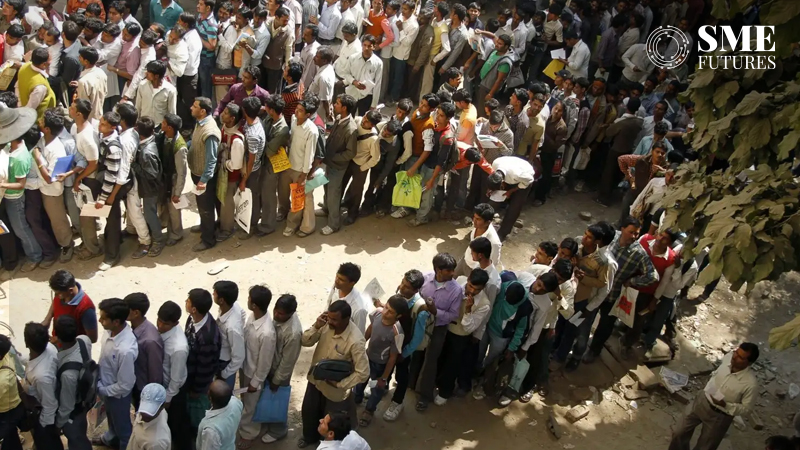Indians are experiencing two Indias: one in which young people are jobless and have gathered in a 25,000 strong mob near Mumbai airport to compete for a restricted number of jobs. The other India comprises of a state government that has just approved a bill mandating 50% to 100% reservation in jobs for domiciled state nationals, regardless of sector. The clearing of the ‘State Employment of Local Candidates in Industries Factories and Other Establishments Bill,’ has been slammed hard by India inc. However, there are people appreciating the move.
For the uninitiated, these events are significantly different from one another. However, they are somehow connected and paint a bleak picture of the job market at a time when the Indian economy is booming.
If you go by CMIE research over the years on unemployment rate, it shows that year 2024 has gotten worse, even as India’s working population has been skyrocketing. In June, it was 9.2%, a sharp increase from 7% in May 2024. In April and March 2024, it was 8.1% and 7.4% respectively.
Unemployment rate in India
For more clarity, here is the historical data for the unemployment rate in India over the last seventeen years:

Analysing the data gives some food for thought: is everything all right in the employment sector when we are talking about job creation, AI capabilities, and employment among other ideas?
There is a need for balance
Both situations highlight the challenging job market, with Karnataka’s approach addressing regional employment disparities and Mumbai’s incident underscoring the urgent need for effective job creation strategies.
“These scenarios reveal the complexities of the job market and underscore the necessity for balanced, sustainable employment policies that can accommodate both local and broader economic needs,” says Dr. Somdutta Singh, Founder and CEO Assiduus, Investor and Ex-Member Niti Aayog.
Let’s think strategically. The job market is influenced by numerous factors, economic growth, technological advancements, educational attainment, and policy decisions.
“The Karnataka bill attempts to address regional disparities by ensuring local candidates are given priority, but it raises questions about the balance between local reservations and the need to attract diverse talent to drive innovation and productivity. Conversely, the Mumbai incident starkly illustrates the immediate pressures of a saturated job market, where a large pool of job seekers competes for limited opportunities. There is an urgent need for creating more jobs and improving job market efficiency,” she asserts.
According to her, effective job creation strategies must consider the dynamic nature of our economy, including the rise of automation and the gig economy, that are reshaping traditional employment landscapes.
Policies need to foster an environment that encourages entrepreneurship and the growth of SMEs, which are vital for job creation. Additionally, there must be a focus on continuous skill development and education to ensure that the workforce remains adaptable and competitive in a rapidly changing global market.
“We also need to strengthen social safety nets and labour rights to protect workers in precarious employment situations, ensuring they have access to fair wages and benefits. Ultimately, keep this in mind that achieving a balanced and sustainable job market requires a multi-faceted approach that addresses both immediate employment needs and long-term economic goals, fostering an inclusive environment where all individuals have the opportunity to succeed,” she emphasises.
Skill development needs to be prioritised
AR Ramesh, CEO at TeamLease Degree Apprenticeship, highlights the urgent need for skill development in the country. According to him, currently, skill development needs to be prioritised to address the gap between the available opportunities and the requisite skills for employability.
Concerned about the Karnataka Government’s controversial job bill, which is now on hold after the backlash, he says that implementing such reservations may adversely affect the state’s productivity and the attractiveness of its capital, ultimately impacting its GSDP and per capita Net State Domestic Product, where it currently holds the 4th position. As the epicentre of India’s IT revolution, Karnataka risks unsettling national and international tech giants that rely on a skilled workforce.
“It is vital that a thriving state like Karnataka is founded on the principles of meritocracy. Although the state’s growth in manufacturing, services, and related industries has resulted in significant migration, the focus should be on enhancing skills and productivity rather than on erecting artificial barriers,” he says.
To negate the issue and establish an enabling environment for learning and skills development, Ramesh suggests apprenticeships as a practical solution. “It will enhance the employability of local youth, thus bolstering their competitiveness in the job market,” he contends.

The two scenarios show that India’s job market is at a crossroads. While state-level initiatives like Karnataka’s bill aim to address regional employment disparities, they also highlight the challenges of implementing such policies without stifling innovation and productivity. Meanwhile, incidents like the Mumbai job rush underscore the urgent need for comprehensive job creation strategies.
The future of India’s employment landscape hinges on balanced policies that promote skill development, encourage entrepreneurship, and create an inclusive job market. Only then can India ensure sustainable economic growth and provide its workforce with ample opportunities for success.











